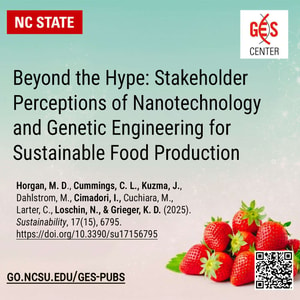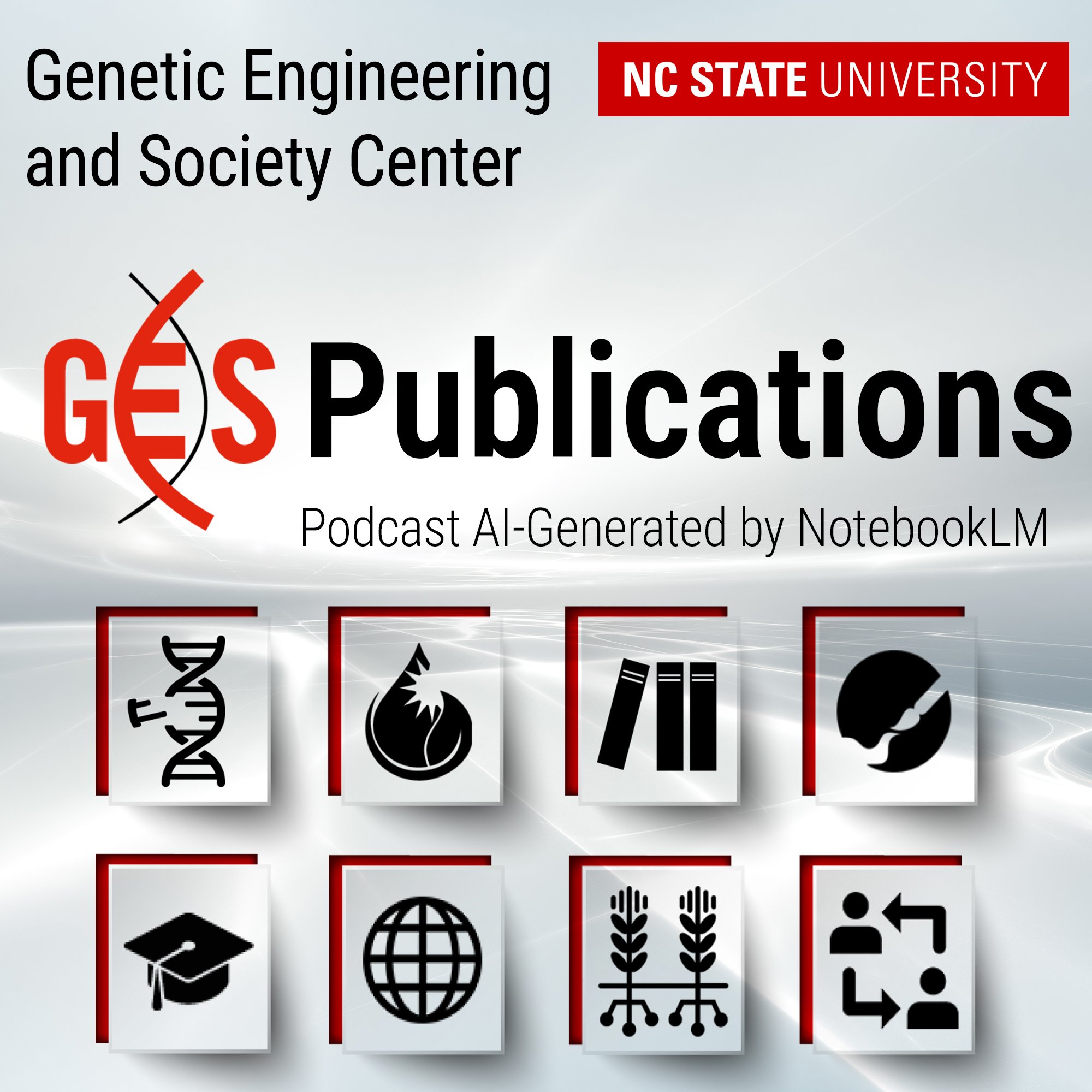S1E1 - Beyond the Hype: Stakeholder Perceptions of Nano & GE for Sustainable Food

Commentary and overview of GES Center publications, AI-generated by NotebookLM
Beyond the Hype: Stakeholder Perceptions of Nanotechnology and Genetic Engineering for Sustainable Food Production
This episode of the GES Publications podcast provides an AI-generated overview of the article below, highlighting key findings and insights into the societal dimensions of biotechnology. Episodes are created using Google Gemini’s NotebookLM to summarize faculty and student publications from NC State University’s Genetic Engineering and Society Center.
DOWNLOAD FULL EPISODE TRANSCRIPT HERE.
Citation
Horgan, M. D., Cummings, C. L., Kuzma, J., Dahlstrom, M., Cimadori, I., Cuchiara, M., Larter, C., Loschin, N., & Grieger, K. D. (2025). Beyond the Hype: Stakeholder Perceptions of Nanotechnology and Genetic Engineering for Sustainable Food Production. Sustainability, 17(15), 6795. https://doi.org/10.3390/su17156795. PDF. Graphic
Authors
Madison D. Horgan, Christopher L. Cummings, Jennifer Kuzma, Michael Dahlstrom, Ilaria Cimadori, Maude Cuchiara, Colin Larter, Nick Loschin, and Khara D. Grieger
Abstract
Ensuring sustainable food systems is an urgent global priority as populations grow and environmental pressures mount. Technological innovations such as genetic engineering (GE) and nanotechnology (nano) have been promoted as promising pathways for achieving greater sustainability in agriculture and food production. Yet, the sustainability of these technologies is not defined by technical performance alone; it hinges on how they are perceived by key stakeholders and how well they align with broader societal values. This study addresses the critical question of how expert stakeholders evaluate the sustainability of GE and nano-based food and agriculture (agrifood) products. Using a multi-method online platform, we engaged 42 experts across academia, government, industry, and NGOs in the United States to assess six real-world case studies—three using GE and three using nano—across ten different dimensions of sustainability. We show that nano-based products were consistently rated more favorably than their GE counterparts in terms of environmental, economic, and social sustainability, as well as across ethical and societal dimensions. Like prior studies, our results reveal that stakeholders see meaningful distinctions between nanotechnology and biotechnology, likely due to underlying value-based concerns about animal welfare, perceived naturalness, or corporate control of agrifood systems. The fruit coating and flu vaccine—both nano-enabled—received the most positive ratings, while GE mustard greens and salmon were the most polarizing. These results underscore the importance of incorporating stakeholder perspectives in technology assessment and innovation governance. These results also suggest that responsible innovation efforts in agrifood systems should prioritize communication, addressing meaningful societal needs, and the contextual understanding of societal values to build trust and legitimacy.
Significance
Technological innovations such as genetic engineering (GE) and nanotechnology (nano) have been promoted as promising pathways for achieving greater sustainability in agriculture and food production. Yet, the sustainability of these technologies is not defined by technical performance alone; it hinges on how they are perceived by key stakeholders and how well they align with broader societal values. This study addresses the critical question of how expert stakeholders evaluate the sustainability of GE and nano-based food and agriculture (agrifood) products.
Keywords
Agrifood technologies; Genetic engineering; Nanotechnology; Perceptions of sustainability; Stakeholder engagement; Responsible innovation; Technology governance
Genetic Engineering and Society Center
Explore More
- Browse the full GES publication library: go.ncsu.edu/ges-pubs
- Learn about the GES Center: go.ncsu.edu/ges
- For live recordings from our Colloquium series, subscribe to our companion podcast, GES Center Lectures: go.ncsu.edu/ges-podcast
GES Center at NC State University—Integrating scientific knowledge & diverse public values in shaping the futures of biotechnology.
Produced by Patti Mulligan, Communications Director, GES Center, NC State
Find out more at https://ges-publications.pinecast.co
